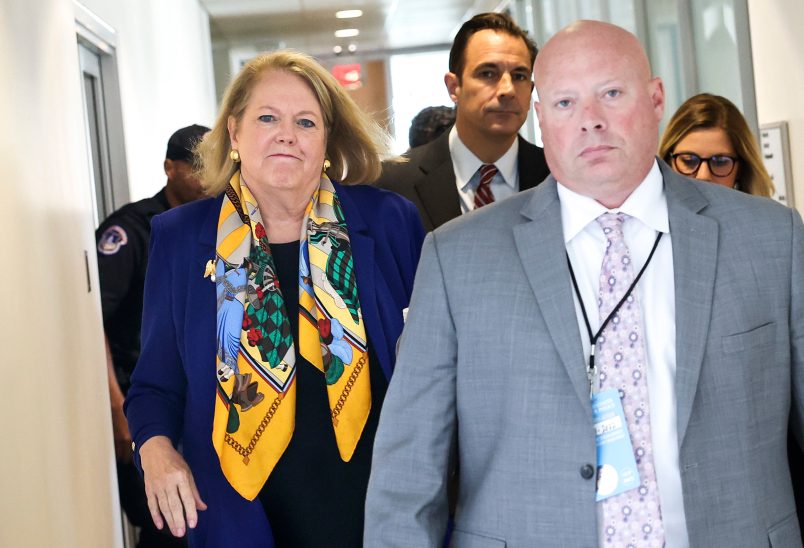Throughout her questioning by the Jan. 6 committee, Ginni Thomas sporadically makes her displeasure known.
“You know what it means,” she snaps at the questioner who’s asking her to explain a concept in one of her emails. “Are we done?” she asks a couple of times, about halfway through the deposition.
But she seems to direct special ire toward the fact that the Washington Post and CBS News obtained her texts with Mark Meadows, which revealed her efforts to cajole Meadows into continuing to fight to overturn the 2020 elections. (Meadows provided at least some of his messages to the committee in 2021 before he stopped cooperating, and, later, to the DOJ. Some of those texts were obtained and published by news outlets, including, this month, TPM.)
Thomas said throughout her September 2022 interview with the committee that the texts were sent in a moment of high emotion for her, that she regrets writing them and that she wasn’t involved in any high-level schemes to get the election tossed.
“I am certain I never spoke with him about any of the legal challenges to the 2020 election, as I was not involved in those challenges in any way,” she says in an opening statement, referring to her husband, Justice Clarence Thomas. “And I do know he was completely unaware of the texts that I had with Mark Meadows until this committee leaked them to the press while my husband was in a hospital bed in March fighting an infection.”
It’s a thread that shoots through her comments. She brings it up when asked if she talked to any Trump administration members about challenging the 2020 election.
“No, except, you know, I can certainly look at those wonderful Mark Meadows texts that were made public by the committee, unfortunately, that certainly showed I was — I was certainly hoping that they would challenge the election until the truth could be found out if there was evidence of state problems in the election,” she responds.
Committee member Adam Schiff (D-CA) jumps in at one point to probe Thomas’ repeated contentions that she regrets the texts, trying to determine whether she regretted writing them or regretted that they became public.
“I think it might be a unanimous view of everyone on this call and in this room that I don’t know how many of you would want your texts to become public on the front page of the Washington Post,” she says. “Certainly I didn’t want my emotional texts to a friend released and made available.”
The Meadows text release, though, is not her only lingering grudge.
At one point, she brings up that a Washington Post reporter went “a little crazy” in 2000 over her work with the Heritage Foundation, a reference to news that she worked at the Foundation and collected resumes for potential future-Bush administration members even while her husband was hearing Bush v. Gore. She adds in her deposition that it “became a big kerfuffle in the press.”
She also struggles to contain herself when investigators bring up her sending of emails to swing state lawmakers, urging them to overturn Joe Biden’s win. That effort was covered by numerous outlets, starting with a May 2022 Washington Post report about her Arizona-focused activism.
Her lawyer, Mark Paoletta, jumps in to tell investigators that Thomas had merely amplified the already-existing campaign to sway lawmakers, and was not a critical part of its development.
“Can we agree that the media completely messed this up?” Thomas blurts out.
“Don’t —,” begins Paoletta.
“Oh sorry,” Thomas says. “Never mind.”



